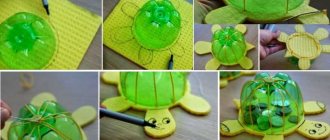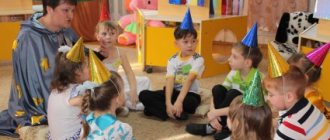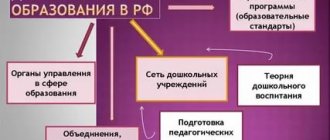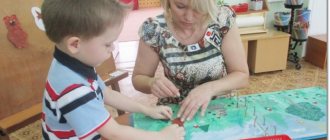Formation of professional competencies of preschool teachers
Modern standard for a preschool teacher
Requirements from educational standards for a preschool teacher include knowledge of the specifics of preschool education, willingness to plan and adjust tasks, participation in creating a psychologically comfortable environment, proficiency in digital technologies and other components.
In general, the professional competencies of a teacher imply active psychological, communicative and research activities. The popular educational course “Paths” is aimed at preparing a child for school through creativity. But for this form of work, the teacher himself needs to be able to solve his professional problems with the help of creativity. In recent years, much has been said about unlocking a child’s potential, but it is also important to think about the teacher’s internal resources, his professional and personal development.
Salutogenic factors that positively influence the formation of pedagogical competencies:
- High level of intelligence and creativity.
- Communication skills, willingness to cooperate.
- Formation of special interests and hobbies.
- Positive self-confidence.
- Increased locus of control.
The basis of pedagogical acmeology - the science of continuous professional improvement of a teacher - is the principle of mutual learning. You can improve your professional skills in the form of tutor support.
ABC for preschoolers. We play and read together. 5-7 years.
Training using three textbooks in the set (“Playing with sounds and words” - notebooks No. 1, 2, “Playing and reading together”) creates in children an interest in further learning their native language, strong reading and literate writing skills. The purpose of the “Let's Play and Read Together” guide is to lay the foundations of reading and writing skills. In the manual, children get acquainted with the letters denoting the consonant sounds zh, sh, shch, x, ts, ch, letters soft sign, hard sign. A different application contains cards with letters for all consonant sounds.
Buy
Tutoring
A tutor is a teacher who ensures the development of individual programs and accompanies the process of their implementation. Tutoring is useful not only when working with students, but also within the teaching staff.
Model of tutor action in a preschool educational institution
1. Crystallization stage
Action:
Creating a "Redundant Environment" selection environment.
Mechanism:
Auction, fair of ideas.
Result:
Formation of orders, formation of individual and modular groups in the main shortage area.
2. Design stage.
Action:
Navigation.
Mechanism:
Tutorat (coach meeting).
Result:
Adjusting the order, forming expectations for events, developing an interaction strategy (targeted support).
3. Implementation stage.
Action:
Implementation of an individual plan.
Support modules:
Workshops, laboratories, coaching sessions.
Result:
Studying cases, technological maps and didactic materials, mastering pedagogical technologies, developing professional thinking.
4. Analytical stage.
Action:
Tutor tests “Choice environment”.
Mechanisms:
Open day, fair of ideas.
Result:
Writing essays, compiling cases.
Thus, in mutual assistance “teacher to teacher,” the level of proficiency in social methods and techniques of the deficit direction increases.
We speak correctly. We talk and write. Benefit for children 6-8 years old
The proposed manual will help the child learn: • determine the semantic (logical) sequence of the plot; • build coherent statements based on pictures; • use a rich imagination; • interact with adults and peers. The manual is intended for individual work with children aged 6–8 years, both in a preschool educational organization and in the family.
Buy
Coaching
Coaching is a technology aimed at unlocking an individual's potential. The competencies of a teacher and a coaching specialist largely coincide. A modern educator acts not just as a consultant, but as a professional inspirer, giving advice on finding and solving educational problems. Coaching techniques also suggest ways to develop a teacher’s professional competence.
Consider the “Balance Wheel”
, successfully implemented in work with novice educators:
- At the first coaching meeting with a young specialist, we draw a circle divided into equal parts. Each of them represents possible problem areas: growth prospects, teamwork, planning, mastery of pedagogical techniques, self-analysis, job responsibilities, age and characteristics of children. The teacher ranks each problem from 1 to 10 in different colors on the “wheel”. This allows you to clearly see what causes the main difficulties in his work.
- Let's draw up the first 3 steps to strengthen the weakest sector. We assign a tutor.
- The tutor sets 3 simple, clear tasks with a limited deadline for the young teacher.
- At the next meeting with the tutor, the teacher turns in completed assignments and draws a new “Balance Wheel” to mark his progress.
Results:
- Understanding the situation.
- Understanding what could have been better.
- Understanding how to do better.
- Thus, with the help of technologies, borrowed, among other things, from business and marketing, it is possible to increase professionalism and develop the competencies of educators.
Features of the professional competence of a preschool teacher in the context of the implementation of the Federal State Educational Standard before
Alla Frantsuzova
Features of the professional competence of a preschool teacher in the context of the implementation of the Federal State Educational Standard before
The function of a kindergarten is the purposeful socialization of a child’s personality, that is, introducing him to the world of natural and human connections and relationships, transferring to him the best examples, methods and norms of behavior in all spheres of life. of upbringing – depends on how competently the educational process is structured in a preschool institution . Therefore, in modern society, serious demands are placed on the teacher and on the level of his professional competence .
To determine the content of the professional competence of a preschool teacher , we will analyze the concepts identified by the researchers. Professional competence is :
a range of issues in which someone is well informed, fully meeting the requirements of a given production, a given field of activity (S. I. Ozhegov)
;
the ability tasks within his (D. S. Savelyev)
;
the sum of knowledge, skills and abilities acquired by the subject and necessary for his successful activities (A. P. Akimov)
;
an integral characteristic of the business and personal qualities of a specialist, reflecting not only the level of knowledge, skills, experience sufficient to achieve the goals of professional activity , but also the social and moral position of the individual (A. D. Goneev, A. G. Pashkov)
;
the formation, on the basis of general education, of such professionally significant qualities for the individual and society that allow a person to realize himself most fully in specific types of work activity that correspond to the socially necessary division of labor and market incentive mechanisms (B. S. Gershunsky)
.
Thus, it can be stated that professional competence is the sum of acquired knowledge, accumulated experience and developed skills that allow a person (teacher)
quickly solve assigned tasks in
the professional field .
To clarify the content of a teacher’s professional competence , let’s analyze the document “ Professional Standard of a Teacher ”
, which lists
the professional competencies of a preschool teacher ( educator) , reflecting the specifics of work in a preschool educational institution. According to this project, a modern preschool teacher must:
know the specifics of preschool education and the features of organizing educational work with children of early and preschool age;
know the general patterns of child development in early and preschool childhood, features of the formation and development of children's activities in early and preschool age;
be able to organize the main types of activities in preschool age: object-manipulative and gaming, ensuring the development of children. Organize joint and independent activities of preschoolers;
master the theory and pedagogical methods of physical, cognitive and personal development of children of early and preschool age;
be able to plan, implement and analyze educational work with children of early and preschool age in accordance with the Federal State for preschool education;
be able to plan and adjust educational tasks (together with a psychologist and other specialists)
based on monitoring results, taking into account the individual
characteristics of each child of early and/or preschool age;
implement pedagogical recommendations of specialists (psychologist, speech therapist, defectologist, etc.)
in working with children who have difficulty mastering the curriculum or children with
special educational needs;
participate in the creation of a psychologically safe, modern and comfortable educational and developmental environment, ensuring the safety of children’s lives, preserving and strengthening their health, supporting the emotional well-being of the child during their stay in an educational organization;
possess ICT competencies necessary and sufficient for planning, implementation and evaluation of educational work with children of early and preschool age.
The listed knowledge and skills of the teacher allow us to conclude that the professional competence of a teacher is the ability to effectively carry out pedagogical activities determined by job responsibilities, based on scientific education and an emotional and value-based attitude to teaching activities. Professional competence presupposes that preschool teacher professionally significant attitudes and personal qualities, theoretical knowledge, professional skills that he will improve in the process of self-education.
We can assume that increasing the professional competence of a teacher in the conditions of the Federal State Educational Standard for Educational Education can be facilitated by the methodological work into which each teacher is immersed. One of the forms of such work is the pedagogical council, which discusses issues of educational work with children, the introduction of new modern technologies, achievements in science and pedagogical practice into the work of the team. One of the effective forms of communication between teachers is a conference - it allows you to put all educators on an equal footing , ensures interaction and openness. The most effective form of methodological work remains seminars, seminars - workshops and master classes in which the skills of teachers are improved, and accumulated pedagogical experience is exchanged.
The immersion of teachers in methodological work, the constant search for effective and modern technologies, will help ensure an increase in the professional competence of the teacher , as it consolidates the knowledge independently acquired in practical or analytical work, and forms the knowledge and skills necessary for professional activities.
Factors influencing the development of professional competence of a teacher
The development of a teacher’s professional competence is largely determined by his internal resources, i.e. level of personal development, intellectual development, moral orientation of activity, creative approach to business.
Among the factors of internal development of a preschool teacher that have a positive impact on the development of his professional competence, the following can be identified:
- High level of intellectual development.
- Developed creative thinking. It presupposes a creative vision for the implementation of one’s professional activities and the performance of one’s professional functions.
- Communicative development, characterized by a desire for cooperation, positive interaction in the work environment, a willingness to make contact with all subjects of the educational process and the ability to make compromise decisions.
- Having special interests and needs. Here we mean the teacher’s hobby, showing interest in different areas and areas of activity.
- Positive attitude towards your professional activities.
- Confidence in yourself and your own abilities.
- High level of development of control activities and control functions.
The teacher’s professional development is also positively influenced by his need for self-development. A teacher needs to continuously educate himself and improve his knowledge and skills, master new ways of working, new directions for implementing the educational process, get acquainted with advanced pedagogical experience and apply it in practice.






